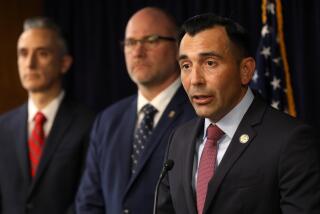Davydenko gambling investigation hangs over tennis as season begins
- Share via
Nikolay Davydenko’s lawyer is venting into the telephone.
“They are leaving him in the dark,” bemoans Frank Immenga, the man representing the fourth-ranked tennis player in the world, a player connected to a gambling investigation that is stretching into its sixth month.
“The ATP opened up this big box of corruption,” Immenga continues, speaking from his law office in Germany, “and they need somebody to blame.”
With a new Grand Slam tennis season beginning Monday at the Australian Open, Davydenko’s case and broader issues about integrity are hanging over a sport long associated with country clubs but now revealing a seamier side.
If Immenga sounded upset, his client’s tone during an interview with the BBC might best be described as curious.
“Maybe they just found one tennis player who they want to remove from the world’s top 10,” said Davydenko, who played in the Kooyong Classic exhibition tournament in Melbourne this week. “Maybe there is someone below me in the rankings who is more popular and they want to increase his popularity.”
Since tennis’ top players dispersed after the last major tournament, the U.S. Open, plenty has transpired off the court:
Three professional players from Italy were suspended for betting on others’ matches. Martina Hingis was found guilty of testing positive for cocaine. And entering the realm of the truly bizarre, former No. 2-ranked Tommy Haas wondered aloud whether his after-dinner latte macchiato could have been poisoned during Germany’s Davis Cup matches against Russia.
“Of course, I’d prefer that the only things written about tennis were about the great, on-court match action,” WTA Tour head Larry Scott said last week during an interview about the Hingis ruling. “But we do live in a day and an age where these types of issues do come up. Every sport has to deal with some of the same pressures and temptations that exist in society.”
Drawing the most attention in the world of tennis has been the ATP’s investigation into what exactly caused heavy and odd wagering on an otherwise nondescript clay-court match in August at Sopot, Poland, between Davydenko and Martin Vassallo Arguello. About $7 million was gambled on the outcome, with more money coming in to back the 87th-ranked Arguello after he lost the opening set; Davydenko wound up quitting in the third set, citing a foot injury.
An Internet betting site voided all wagers, an unprecedented move.
Immenga has said ATP investigators told him that nine people based in Russia bet $1.5 million on Davydenko losing.
Davydenko spoke to investigators in September, then turned over telephone records that were requested. Davydenko’s wife and brother were interviewed in November; Immenga described Davydenko’s brother as “more or less his coach.”
While the ATP will not discuss details of its inquiry, the tour did take issue with complaints from Davydenko and his attorney about why there has not been a resolution to the case.
“This is a thorough, comprehensive and, above all, fair investigation, designed to ascertain whether anything of concern took place in the (Sopot) match,” ATP spokesman Kris Dent said from London on Friday.
“While it is within his rights to do so, the continued delays experienced in receiving key information requested from the player and his associates is naturally contributing to the ongoing length of the investigation,” Dent said.
Immenga said that he received this week a formal request that phone records of Davydenko’s wife and brother from July and August be turned over within 15 days of Davydenko’s last match at the Australian Open.
The lawyer said he thought that request could have been made sooner -- and also said he’s not sure when or whether that request will be met.
“Pursuant to my understanding, they can’t ask them to turn them over because they are not under the jurisdiction of the ATP,” Immenga said.
The section of the tour’s rule book that outlines the ATP’s anti-corruption program requires players and their support personnel -- defined as “any coach, trainer, manager, agent, family member, tournament guest or other affiliate or associate of any player” -- to cooperate fully with investigations, including furnishing telephone records, Internet service records and computer hard drives.
As all players must do in order to be able to compete on tour, Davydenko signed the ATP player contract for 2008, agreeing to comply with the rulebook.
“They have not worked very professionally. We have not received any transcripts of the interviews which were conducted in September. Imagine that. That’s the way these guys work,” Immenga said.
“Maybe in two or three months, they are going to one day come up with a statement, ‘OK, we have not found anything,’” he added. “That’s what we hope.”
Until an independent hearing officer rules on the case, though, it will continue to be discussed.
Davydenko’s manager was rebuffed last year when he first approached the director of the Kooyong Classic, Colin Stubs, about the Russian participating in the event. But when another player withdrew before the tournament, Stubs changed his mind and invited Davydenko.
“As time wore on, it became obvious it’s not a simple matter -- even the ATP is taking a long time over it,” Stubs said. “It seems unfair for a guy to play tennis under such a cloud.”
More to Read
Go beyond the scoreboard
Get the latest on L.A.'s teams in the daily Sports Report newsletter.
You may occasionally receive promotional content from the Los Angeles Times.









